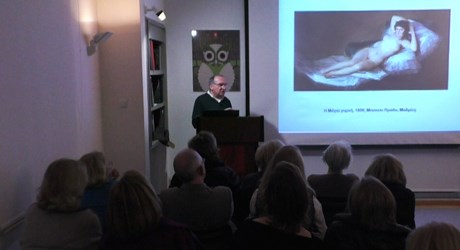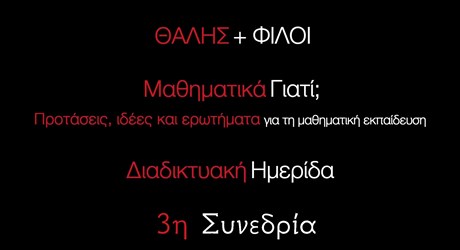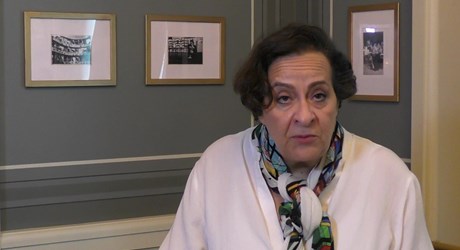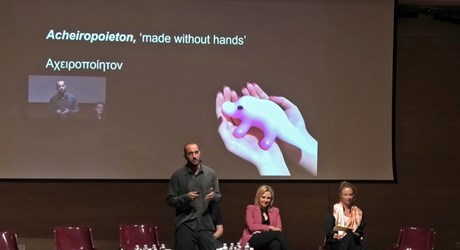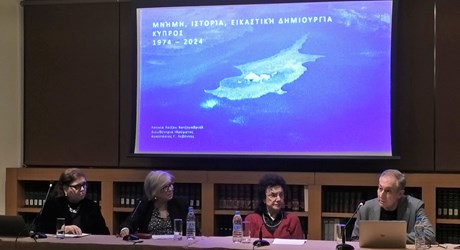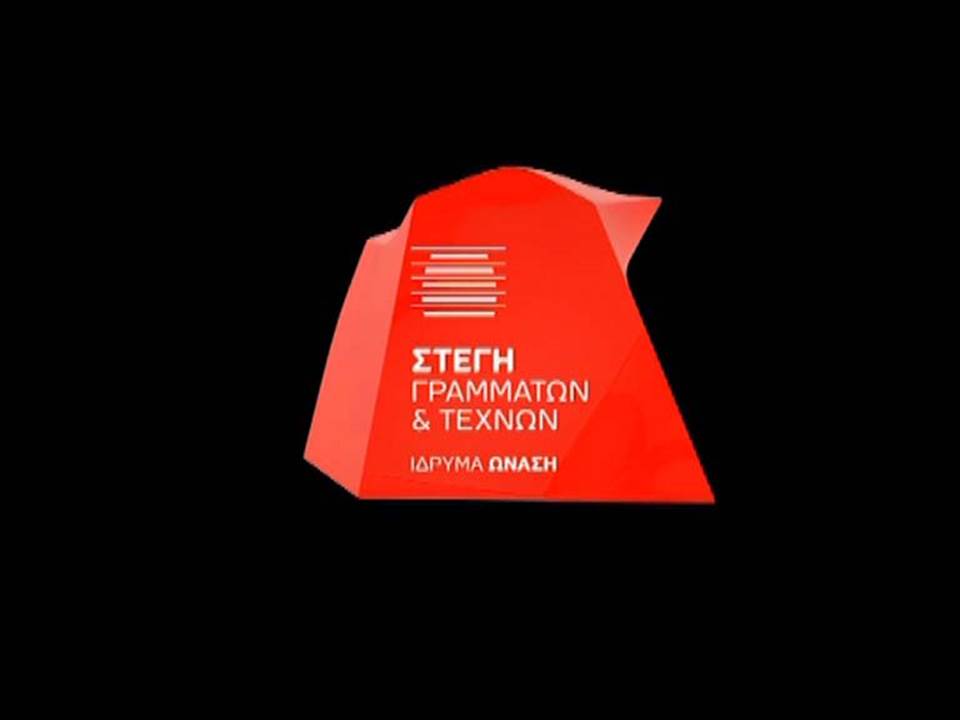
Κάργα Βαλεντίνα
Petti Alessandro
Vickers Ben
Reyes Nájera César
Tan Pelin
Γλώσσα
Αγγλική
Ημερομηνία
28/06/2015
Διάρκεια
118:38
Εκδήλωση
Λέξεις & Σκέψεις στη Στέγη
Χώρος
Στέγη Γραμμάτων και Τεχνών
Διοργάνωση
Στέγη Γραμμάτων και Τεχνών του Ιδρύματος Ωνάση
Κατηγορία
Τέχνες / Πολιτισμός
Ετικέτες
εικαστική δημιουργία
Scroll down for English Version
Στην ανάρτηση αυτή, οι ομιλίες δημοσιεύονται στην αγγλική γλώσσα, είτε στην αγγλική πρωτότυπη εκφορά τους είτε με παράλληλη μετάφραση από τα ελληνικά στα αγγλικά.
Αν θέλετε να παρακολουθήσετε την εκδήλωση με τις ομιλίες δημοσιευμένες στην ελληνική γλώσσα, πατήστε εδώ.
As a research process, Adhocracy displays examples but also triggers discussions about the main subjects structuring the exhibition: people making things and making the commons. Understanding the call for action to set ad-hoc questions and responses to current challenges, this symposium gives the floor to people experienced in both areas, to discuss the main topics and compare experiences that have been developed during the run of the exhibition.
Click here to read more about the Adhocracy [Athens] exhibition.
Adhocracy symposium – 2nd session: "Making the Commons"
Practices of commoning have become a main discussion theme since the occupy movements and the invention of modalities of solidarity. The whole outcome of pointing to a developing General Intellect of collectivities and communities creates an optimistic future of living together that provides alternative ways of economies, pluralities and being together not only under austerity but also within global neoliberal policies. Design, architecture and urban space meet these discussion at every level and scale. As the force of the market is very strong and governmental policies are unavoidable, the question remains: How is possible for our commoning practice to stand and develop together? What is the organization and hierarchy in the practice of making commons; do we need it? How do Making commons differ in heterogeneous realities in different geographies? How we can discuss commons as ontological category and epistemic category at the same time? What is the position demanded of new educational systems?
Chair:
César Reyes Nájera, Introduction / Presentation of the speakers (5')
Pelin Tan, Presentation of the exhibition (5')
With:
Valentina Karga, Presentation (15')
Alessandro Petti, Presentation (15')
Ben Vickers, Presentation / Commentary (15')
Valentina Karga, born in Chalkidiki, Greece, is an artist with a background in architecture, based in Berlin. After she got her degree in architecture from the University of Thessaly, she has been a fellow at the Graduate school, University of the Arts Berlin (UdK). Often through collaborative actions, her work addresses issues such as autonomy, education, sustainability, communication, the DIY and the commons. Valentina’s projects encourage engagement and participation, some times ending up imagining alternatives for societal structures, such as economy and pedagogic institutions. Among her projects is the “Summer school for Applied Autonomy” in Berlin, a research initiative interested in capturing the technical know-how but also the social, political and affective aspects involved in autonomous living. She is also a founding member of Collective Disaster. She has shown her work at the National Museum of Contemporary Art in Athens, the Athens Biennial and in a major exhibition curated by Whitechapel Gallery. At the moment, together with PieterjanGrandry, they are the artists in residence for the VilémFlusser program for artistic research in Berlin.
Ο Αλεσσάντρο Πέττι είναι αρχιτέκτονας και μελετητής πολεοδομίας, ιδρυτικό μέλος και συν-διευθυντής του DAAR (Ινστιτούτο Αποαποικιακής Αρχιτεκτονικής), ενός αρχιτεκτονικού γραφείου και προγράμματος φιλοξενίας καλλιτεχνών που συνδυάζει τις εννοιολογικές θεωρίες και τις αρχιτεκτονικές παρεμβάσεις (www.decolonizing.ps). Παράλληλα με την έρευνα και την πρακτική εξάσκηση, ο Πέττι ασχολείται επίσης με την κριτική παιδαγωγική, ενώ είναι ιδρυτικό μέλος του Campusin Camps, ενός πειραματικού εκπαιδευτικού προγράμματος που φιλοξενείται στον παλαιστινιακό προσφυγικό καταυλισμό Dheisheh στη Βηθλεέμ (www.campusincamps.ps).
Ο Πέττι έχει γράψει για την αναδυόμενη χωρική τάξη, που υπαγορεύεται από το υπόδειγμα ασφάλειας και ελέγχου, στο βιβλίο Arcipelaghieenclave ([Αρχιπέλαγος και θύλακοι], BrunoMondadori, Μιλάνο 2007) και, πιο πρόσφατα, συνέγραψε –από κοινού με τα άλλα δύο ιδρυτικά μέλη του DAAR, τη Sandi Hilalκαι τον Eyal Weizman– το βιβλίο Architectureafter Revolution([Η αρχιτεκτονική μετά την επανάσταση], Sternberg, Βερολίνο 2014), μια πρόσκληση για αναστοχασμό των σημερινών αγώνων για δικαιοσύνη και ισότητα, όχι μόνο μέσα από την ιστορική προοπτική της επανάστασης, αλλά επίσης και από εκείνη της συνεχιζόμενης πάλης για αποαποικιοποίηση.
Alessandro Petti is an architect and researcher in urbanism, founding member and co-director of DAAR, an architectural office and an artistic residency program that combines conceptual speculations and architectural interventions (www.decolonizing.ps). Alongside research and practice, Petti is engaged in critical pedagogy, he is the founding member of Campus in Camps an experimental educational program hosted in Dheisheh refugee camp Bethlehem (www.campusincamps.ps).Petti has written on the emerging spatial order dictated by the paradigm of security and control in Archipelagos and enclaves (Bruno Mondadori, Milan 2007) and more recently he co-authored the book Architecture after Revolution (Sternberg, Berlin 2014) an invitation to rethink today’s struggles for justice and equality not only from the historical perspective of revolution, but also from that of a continued struggle for decolonization.
Architect.PhD in Bio-climatic Construction Systems and Materials. Co-founder ofdpr-barcelona. His work seeks a thermodynamic approach to architecture focusing on social issues and the exchange of matter and information in urban environments. He also researches the development and application of biomaterials in architecture. Co-curator of Think Space 2013-2104 Cycle in Zagreb and the Adhocracy ATHENS 2015 exhibition for the Onassis Cultural Center.
Pelin Tan is a sociologist and art historian. She concluded her PhD on socially engaged art in urban space and her post-doc on methodology of artistic research at MIT. Tan researched artist run spaces and urban justice in Europe (2004), Asia and Japan (2012, 2015). With Anton Vidokle, she is the co-director of sci-fi film episodes 2084 about the future of art. She is a member of video collectives Artıkişler/videoccupy and bak.ma an open digital media archive of political movements in Turkey. Tan is an associate professor at the Architecture Faculty, MardinArtuklu University, Turkey. Her forthcoming publication is ARAZİ (Sternberg Press, Berlin, 2015).


![Συμπόσιο Adhocracy: Από την κατασκευή αντικειμένων στη δημιουργία των κοινών (Στο πλαίσιο της έκθεσης Αdhocracy [Athens]) – 1η Συνεδρία Συμπόσιο Adhocracy: Από την κατασκευή αντικειμένων στη δημιουργία των κοινών (Στο πλαίσιο της έκθεσης Αdhocracy [Athens]) – 1η Συνεδρία](/media/7514/lecture-02258_thumbnail.jpg?anchor=center&mode=crop&width=460&height=250&anchor=top&rnd=131822831560000000)
![Συμπόσιο Adhocracy: Από την κατασκευή αντικειμένων στη δημιουργία των κοινών (Στο πλαίσιο της έκθεσης Αdhocracy [Athens]) – 2η Συνεδρία Συμπόσιο Adhocracy: Από την κατασκευή αντικειμένων στη δημιουργία των κοινών (Στο πλαίσιο της έκθεσης Αdhocracy [Athens]) – 2η Συνεδρία](/media/7515/lecture-02259_thumbnail.jpg?anchor=center&mode=crop&width=460&height=250&anchor=top&rnd=131822831560000000)
![Adhocracy symposium: From making things to making the commons (In the context of Αdhocracy [Athens] exhibition) - 1st session Adhocracy symposium: From making things to making the commons (In the context of Αdhocracy [Athens] exhibition) - 1st session](/media/7516/lecture-02260_thumbnail.jpg?anchor=center&mode=crop&width=460&height=250&anchor=top&rnd=131822831560000000)
